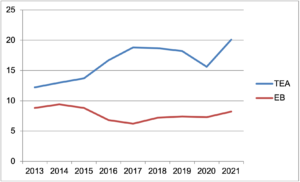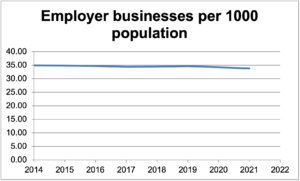Entrepreneurship is growing in Canada. Good news or bad news?
Entrepreneurship is a measure of economic dynamism. Over the last ten years the percentage of the population involved in entrepreneurship in Canada has increased by more than 50 percent, according to the Global Entrepreneurship Monitor. In 2021 about 20% of the adult population was involved in planning or starting up a business.
The graph below shows the evolution in Canada since 2013 using the Global Entrepreneurship Monitor (GEM) database.
 TEA = early stage; EB = established
TEA = early stage; EB = established
This graphic expresses the changing percentage of the country’s adult population (age 18+) engaged in entrepreneurial efforts. The blue line refers to the proportion of total early-stage entrepreneurship activity (TEA), calculated as a combination of two numbers — nascent entrepreneurs, those actively starting up a business, and owner-managers, with a business less than 3.5 years old. The red line shows the proportion of established businesses (EB), owner-managers of a company more than 3.5 year old.
The TEA rate has crept steadily upwards since 2013, with a dip in 2020 due to COVID, while the EB rate has remained fairly constant. At the same time, Statistics Canada data shown below confirms that the number of firms, adjusted for population growth, has remained roughly constant since 2014.
 Is this just a Canadian phenomenon? If you look at the GEM data for several other countries you see exactly the same phenomenon. TEA has risen significantly from 2013 to 2021 — in the UK (by 80 percent), in France (by 70 percent), in Germany (by 40 percent) and in the US (by 30 percent), that compares with the rise in Canada of 70 percent. So this is certainly not a uniquely Canadian situation. Likewise, the EB rate in the other countries has also remained fairly constant over the same period.
Is this just a Canadian phenomenon? If you look at the GEM data for several other countries you see exactly the same phenomenon. TEA has risen significantly from 2013 to 2021 — in the UK (by 80 percent), in France (by 70 percent), in Germany (by 40 percent) and in the US (by 30 percent), that compares with the rise in Canada of 70 percent. So this is certainly not a uniquely Canadian situation. Likewise, the EB rate in the other countries has also remained fairly constant over the same period.
So what is going on? The real answer is that at this point we don’t know for sure. There would appear to be several possibilities at least:
- More people are involved in each new startup. Might this be because startups are becoming more complex requiring more diversity of skills?
- There may be more hybrid entrepreneurs — people who work for a large company and work to develop opportunities either for their employer or for themselves.
- More business consolidations are happening early in the life cycle.
Does it matter? The negatives.
The larger question is: does this really matter? The hard facts are that from an economy-wide perspective, large businesses are much more productive than small businesses. In Canada 2.4 million people (15.1 percent of the labour force) work for large companies, and produce 48.1 percent of the GDP, while 13.7 million people (84.9 percent of the labour force) work for small and medium sized companies and produce 51.9 percent of GDP. So, a person working in a large company, on average, produces 5 times as much GDP as a person working in a small or medium sized company.
Do we put too much effort into encouraging entrepreneurs? Well-known American author Scott Shane thinks so. One of his papers, “Why encouraging entrepreneurship is bad public policy”, argues that the typical start-up is not innovative, creates few jobs, and generates little wealth.
If entrepreneurship is such a good thing, then why is Canada a laggard in innovation and R&D spending? I have previously addressed this question in my blogs, specifically #24 and #29.
Does it matter? The positives
However, it has been well established that entrepreneurs and other outsiders are a main vehicle for introducing radical new technologies to the marketplace. Just think about why Tesla is the leader in electric cars rather than GM or Toyota. The current rise in tech startups in Canada is likely a manifestation of this.
Several large sectors of the Canadian economy, such as retail, construction and healthcare, rely on small and medium sized firms, which make a significant contribution to the overall economy and provide valuable employment.
Also, in a period of economic turbulence, such as we seem to be entering now, having entrepreneurial skills is a valuable attribute, whether in a large company or a startup. The key role of the entrepreneur is to identify opportunities, and then generate the enthusiasm, vision and plans needed to create a successful venture.
Conclusion
Although most startups don’t generate much wealth, innovation or jobs, nevertheless some of them do, and this is a key driver of economic growth.
Peter Josty is Executive Director of The Centre for Innovation Studies (THECIS), a Calgary-based not-for-profit research company specializing in innovation and entrepreneurship. In addition to working in private research and business development, he holds a PhD in chemistry from the University of London and an MBA from the International Institute for Management Development in Geneva.
Many thanks to THECIS GEM Canada Team members Marc Duhamel and Étienne St-Jean, both from the Université du Québec à Trois-Rivières, for helpful discussion on the points in this column.
| Organizations: | |
| Topics: |
Events For Leaders in
Science, Tech, Innovation, and Policy
Discuss and learn from those in the know at our virtual and in-person events.
See Upcoming Events
You have 1 free article remaining.
Don't miss out - start your free trial today.
Start your FREE trial Already a member? Log in
By using this website, you agree to our use of cookies. We use cookies to provide you with a great experience and to help our website run effectively in accordance with our Privacy Policy and Terms of Service.





